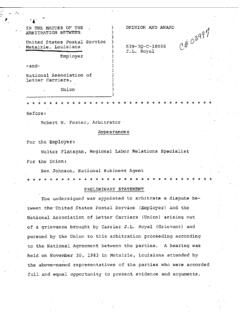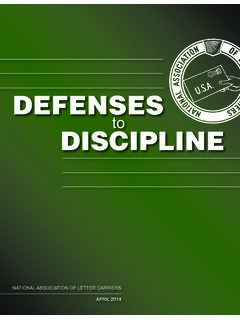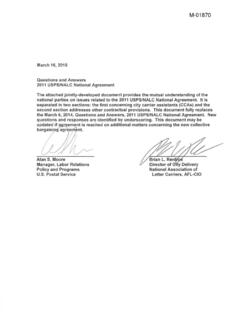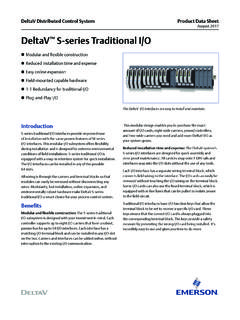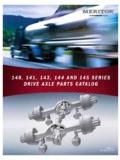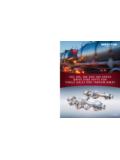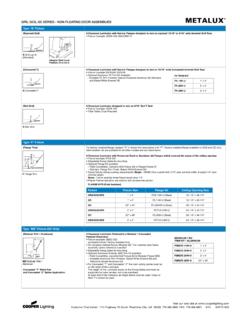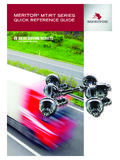Transcription of 666/ - National Association of Letter Carriers
1 666/** ** In the Matter of the )* ArbitrationBetween )* ) ** UNITED STATES POSTAL SERVICE )* ) S4N-3A-D 37169and ) Wanda Blair* ) Dallas, TexasNATIONAL Association OF ) Letter Carriers )* ) ** * * * * * * * * * * * * * * * * * * * * * * * * * * * * * * * *Before: Dennis R. Nolan, Arbitrator, University of South CarolinaSchool of Law, Columbia, SC :For Management:For the Union:John Vallie, LaborRelations 0. AlcorLa, Local auslnessHg eS,1 OPINIONI. Statement of the `_Wanda Blair filed this grievance to challenge her removalfor insubordination and failure to follow instructions. Thearbitration hearing took place in Dallas on February 6, 1987, atwhich time both parties appeared and hadfullopportunity totestify, to examine and cross-examine witnesses,and to presentall relevant parties submitted post-hearing briefs(with supporting arbitration awards) on February 23, of the her removal the Grievant was a Letter carrier atDallas'Airlawn Station.
2 She had worked at the Postal Servicefor five years. For some time she had had difficulty working withher immediate supervisor,David reasons for theirconflict are not clear from the record rut there is some evidencethat Mitchell was inconsiderate and overbearing and other evidencethat the Grievant was touchy and the reasons, their difficulties came to a head onJune 13, 1986. In the course of a routine case check of all hisroutes Mitchell examined some of the Grievant's cased mail andasked her questions about it. Depending on which participant onebelieves the Grievant either yelled at him that he and his questionswere stupid,ran. toward him and snatched her mail out of hishand, or else told him in a normal voice that his questions werestupid and reached out to retrieve her mail.
3 The most likelyinterpretation is that she spoke loudly enough to attract attentionbut did not yell, that the adjective "stupid" applied specificallyto his questions (although she no doubt thought it could equallywell apply to him personally), and that she grabbed the mail backwithout running. I base these conclusions on the relative credibilityof the witnesses (of which more in a moment), the modest impactof the incident on other employees (no witness other than Mitchellheard yelling but one did look around her case to find out whatwas going on) and on the small distance between the Grievant testified that he ordered her to the office ratherthan continue the discussion on. the floor.
4 The Grievant testifiedthat she heard no such is clear however, that Mitchellthen had two other supervisors, James Williams and Israel. Verver,order her to the office and that she refused to go without awitness. At the hearing the Union attempted to raise the defensethat the Grievant was simply exercising herWeingartenright tobe accompanied by a union representative during a Management'sobjection - to that line ofdefense because Article requiresfulldisclosure of theparties' positions during the grievance procedure and the Unionhad never mentioned theWeingartenclaim until the arbitrationhearing. The Grievant further testified that she feared for hersafety if she were in the office alone with Mitchell, but nothingin the record provides the slightest evidence that Mitchell mightattack her.
5 Only after Station Manager Gene Hickson warned her thatcontinued refusal would result in her beingsent home did shefinally go to the office with incident is the primary basis for the charge of Hickson left the Grievant and Mitchell alone in theoffice Mitchell began to question her about certain Express Mailitems signed out to her but allegedly not returned or accountedfor. Proper accounting for Express Mail is a high priority itemat the Airlawn Station. Mitchell testified that he had personallyconducted three meetings for the Carriers to explain proceduresfor handling the Postal Service's premium class of mail on April29, May 7 and May 10, 1986 and introduced supporting notes supposedlymade on the days of the meetings.
6 On cross-examination he repeatedhis statement and flatly denied that he was on vacation on any of-3-those days, even going so far as to say he never took real Union demanded to see his pay records and these showed thathe was indeed on annual leave for the five days from May 5 throughMay 9. The Union does not deny that the other meetings tookplace and I conclude that the Grievant certainly knew how tohandle Express Mail,but Mitchell's misstatements and his introductionof a patently inaccurate(if not contrived)document severelyundercut his later explanation of the contradic-tion, that someone else conducted the meeting on that date butthat he conducted another on some unknown date, is hardly Grievant signed for the three Express Mail items inquestion on May 28.
7 When the carrier returns the receipts or theitems, the clearing clerk makes a notation on Form 3867. Nonem after the Grievant's signature, so in dueforappears on thecourse a clerk mentioned it to 204-B Charles the Grievant about these items on June 12. The removalletter reports her response as "That's your problem," a callousstatement suggesting she did not care about the matter. TheManagement representative admitted at the beginning of the hearingthat she did not use those words; Calloway testified instead thatshe asked "What are you trying to do to me?"and then chargedthat "they were out to get her," statements reflecting outragedinnocence rather than also testified that he could notrememberwhatexplanation she gave for the missing Grievant testified that she did in fact turn the receipts inand blamed the failureto recordthem on the Mitchell began to question her about the receipts thenext day, her fear of being set up was renewed.
8 She told him shedidnot want tohearanything more about it and left the office,telling him to put her off the abrupt exit is also apart of the basis for the insubordination charge. The removal letterand Mitchell say that she leftyellingand thus distracted denies yelling or disrupting others, and the onlyother Management witness to the event to testify,Station ManagerHickson, said that he heard nothing when she left the office. Iconclude that there was little or no harm done by her departureother than to Mitchell's aspects of the removal decision are important. Thefirst concerns its removal Letter purports to with Hickson's testified,though, that Labor Relations Representative LindaWomack"instigated"the removal and Hickson concurred because of the Grievant's second aspect concerns that past record.
9 The removalletter cites three negative elements of her past record:a letterof warning dated September 29, 1984, a seven day suspension dated-4-March 9, 1985 which was a later reduced to a Letter of warning,and a seven day suspension dated March 28, 1986. The second letterof warning should have been removed from her file on March 14,1986. Mitchell denies that he knew this, but Freddie Watson, theSteward at Step 1, said he told Mitchell that the past elementwas cited in error and Mitchell replied that he could do whateverhe wanted to do. Given Mitchell's other misstatements, I acceptWatson's last suspension was in the grievanceprocedure at the time the removal Letter was issued; ultimatelythe suspension was reduced in arbitration from seven to two Management removethe Grievant for just cause?
10 If not,what shall theremedy be?IV. Relevant Contractual Step 1(a): "Any employee who feels aggrievedmust discuss the grievancwith the employee's immediate supervisorwithin fourteen (14) days.."-Article , Step 1(b): In any such discussion the supervisorshall have authority to settle the "Article : "In the administration of this Article, abasic principle shall be that discipline should be corrective innature rather than punitive. No employee may be disciplined ordischarged except for just cause such insubordination,.. failure to perform workas : "In no case may a supervisor impose suspensionor discharge upon an employee unless the proposed disciplinaryaction by the supervisor has first been reviewed and concurred inby the installationhead or " 's emphasizes the facts of the case, arguing thatthese amply document the charges.
